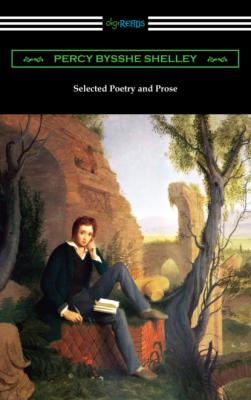Selected Poetry and Prose. Percy Bysshe Shelley
Чтение книги онлайн.
Читать онлайн книгу Selected Poetry and Prose - Percy Bysshe Shelley страница 20
 of a sunnier star,
of a sunnier star,
Spirits from beyond the moon,
Oh, refuse the boon!
DIRGE FOR THE YEAR
I.
Orphan Hours, the Year is dead,
Come and sigh, come and weep!
Merry Hours, smile instead,
For the Year is but asleep.
See, it smiles as it is sleeping,
Mocking your untimely weeping.
II.
As an earthquake rocks a corse
In its coffin in the clay,
So White Winter, that rough nurse,
Rocks the death-cold Year to-day;
Solemn Hours! wail aloud
For your mother in her shroud.
III.
As the wild air stirs and sways
The tree-swung cradle of a child,
So the breath of these rude days
Rocks the Year:—be calm and mild,
Trembling Hours, she will arise
With new love within her eyes.
IV.
January gray is here,
Like a sexton by her grave;
February bears the bier,
March with grief doth howl and rave,
And April weeps--but, O ye Hours!
Follow with May’s fairest flowers.
EPIPSYCHIDION
VERSES ADDRESSED TO THE NOBLE AND UNFORTUNATE LADY,
EMILIA V—,
NOW IMPRISONED IN THE CONVENT OF ——.
———
“L’anima amante si slancia fuori del creato, e si crea nell’ infinito un Mondo tutto per essa, diverso assai da questo oscuro e pauroso baratro.”—HER OWN WORDS.
———
ADVERTISEMENT
The Writer of the following lines died at Florence, as he was preparing for a voyage to one of the wildest of the Sporades, which he had bought, and where he had fitted up the ruins of an old building, and where it was his hope to have realised a scheme of life, suited perhaps to that happier and better world of which he is now an inhabitant, but hardly practicable in this. His life was singular; less on account of the romantic vicissitudes which diversified it, than the ideal tinge which it received from his own character and feelings. The present Poem, like the “Vita Nuova” of Dante, is sufficiently intelligible to a certain class of readers without a matter-of-fact history of the circumstances to which it relates and to a certain other class it must ever remain incomprehensible, from a defect of a common organ of perception for the ideas of which it treats. Not but that gran vergogna sarebbe a colui, che rimasse cosa sotto veste di figura, o di colore rettorico: e domandato non sapesse denudare le sue parole da cotal veste, in guisa che avessero verace intendimento.
The present poem appears to have been intended by the Writer as the dedication to some longer one. The stanza on the opposite page is almost a literal translation from Dante’s famous Canzone
Voi, ch’ intendendo, il terzo ciel movete, etc.
The presumptuous application of the concluding lines to his own composition will raise a smile at the expense of my unfortunate friend: be it a smile not of contempt, but pity. S.
———
My Song, I fear that thou wilt find but few
Who fitly shalt conceive thy reasoning,
Of such hard matter dost thou entertain;
Whence, if by misadventure, chance should bring
Thee to base company (as chance may do),
Quite unaware of what thou dost contain,
I prithee, comfort thy sweet self again,
My last delight! tell them that they are dull,
And bid them own that thou art beautiful.
———
Sweet Spirit! Sister of that orphan one,
Whose empire is the name thou weepest on,
In my heart’s temple I suspend to thee
These votive wreaths of withered memory.
Poor captive bird! who, from thy narrow cage,
Pourest such music, that it might assuage
The rugged hearts of those who prisoned thee,
Were they not deaf to all sweet melody;
This song shall be thy rose: its petals pale
Are dead, indeed, my adored Nightingale!
But soft and fragrant is the faded blossom,
And it has no thorn left to wound thy bosom.
High, spirit-winged Heart! who dost for ever
Beat thine unfeeling bars with vain endeavour,
Till those bright plumes of thought, in which arrayed
It over-soared this low and worldly shade,
Lie shattered; and thy panting, wounded breast
Stains with dear blood its unmaternal nest!
I weep vain tears: blood would less bitter be,
Yet poured forth gladlier, could it profit thee.
Seraph of Heaven! too gentle to be human,
Veiling beneath that radiant form of Woman
All that